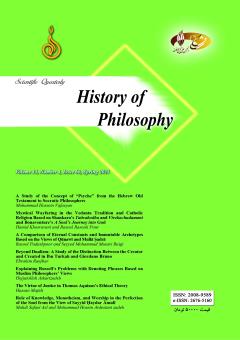Beyond Dualism: A Study of the Distinction Between the Creator and Created in Ibn Turkah and Giordano Bruno
Subject Areas : Geneology of philosophical schools and Ideas
1 - PhD Candidate of Philosophy, Allameh Tabataba’i University, Tehran, Iran
Keywords: encompassing opposition, actual infinite, Ibn Turkah, Giordano Bruno, vinculum,
Abstract :
One of the important issues that has occupied the minds of philosophers since the beginning of the history of metaphysics is the problem of the relationship between the efficient cause or creator and the effect. Various explanations of this topic have been presented in this regard, among which reference can be made to two innovative viewpoints, one belonging to Giordano Bruno and the other to Ibn Turkah, who have propounded their understanding of this relationship based on their own perception of the theory of the unity of being. Giordano Bruno, in his treatise On Cause, Principle, and One, specifically addresses this issue in the second dialogue and explains the related theory based on his previously presented viewpoints, namely the concept of “vinculum” and tries to outline and describe the goal of Renaissance philosophy, which is the realization of the actual infinite, within a reasonable scope. On the other hand, Ibn Turkah, who was aware of the shortcomings and weaknesses of the approach of the unity of the Necessary Being or Creator and, at the same time, tried to philosophically explain the unity of being and provided an opportunity to assume that the unity of being as the source of division, in addition to clarifying the relationship between the manifestor and the manifested, made it possible to preserve the perpetual expansion of the single being or the collective one. In this paper, the authors initially investigate the viewpoints of Giordano Bruno and Ibn Turkah and then demonstrate that if we re-examine Ibn Turkah's approach in light of Bruno's perspective, we can arrive at the assumption of an infinite universe that is constantly expanding.
آنسالدی، ساوریو (1402) شوریدگی و ماخولیا، ترجمۀ ابراهیم رنجبر، تهران: نگاه.
ابرقلس (1955م) رسالة فی الخیر المحض، در الافلاطونیة المحدثة عند العرب، حققها و قدم لها عبدالرحمن بدوی، قاهره: مکتبة النهضة المصریة.
ابن¬ترکه اصفهانی، صائن¬الدین (1393) تمهید القواعد، تصحیح جلال¬الدین آشتیانی، قم: بوستان کتاب.
رنجبر، ابراهیم؛ اسدی، محمدرضا (1402) «هزارتوی عالم؛ واسازی تلقی نیکولاس کوزانوس از جوهر بر اساس دیدگاه مایستر اکهارت و ابن¬سینا»، تاریخ فلسفه، شمارۀ 54، ص114ـ95؛ Dor: 20.1001.1.20089589.1402.14.2.6.8
رنجبر، ابراهیم؛ کلباسی اشتری، حسین (1403) «ناـدیگری: خداوند در فلسفۀ نیکولاس کوسانوس»، فلسفه دین، سال 21، شمارۀ 1، ص73ـ59؛ Doi: 10.22059/jpht.2024.375044.1006040
رنجبر، ابراهیم؛ نوظهور، یوسف (1402). «مابعدالطبیعۀ نوین در فلسفۀ اسپینوزا: واسازی مفهوم ذیل مقام سرمدیت»، غربشناسی بنیادی، سال 14، شمارۀ 1، ص346ـ323؛ Doi: 10.30465/os.2024.48392.1961
فرغانی، سعیدبن محمد (1386) منتهی المدارک و منتهی لب کل کامل و عارف و سالک: شرح تائیه ابن فارض، تحقیق و تصحیح وسام الخطاوی، قم: مطبوعات دینی.
Agrippa, C. (1992). De Occulta Philosophia, Libri Tres. ed. by V. Perrone Compagni. Leiden: Brill Academic Publishers.
Bruno, G. (1583). De la causa, principio et uno. Madrid: Tecnos.
Bruno, G. (2000). Opere magiche. ed. by S. Bassi. Milan: Adelphi.
Bruno, G. (2013). The Ash Wednesday Supper (La cena delle Ceneri). Archon Books.
Calepinii, Ambrosii (1553). Dictionarium, quarto et postremo ex R. Stephani latinae linguae thesauro auctum. Genevae: Oliva Rob. Stephani.
Canone, E. & Ernst, G. (eds.) (2010). Enciclopedia Bruniana & Campanelliana, Giornate di Studio 2005-2008. vol. II. Rome.
Chantraine, Pierre (1968). Dictionnaire étymologique de la langue grecque, Paris, Éditions Klincksieck.
Estienne, H. [Stephanus] (1572). Thesaurus graecae linguae. Genève: Excudebat.
Ficino, M. (1576). Marsilii Ficini Opera omnia. Basel: Henricpetri.
Pattin, A. (1966). Le Liber de Causis: Édition établie à l’aide de 90 manuscrits avec introduction et notes. Tijdschrift Voor Filosofie, vol. 28, no. 1, pp. 90-203.
Tamba, I. (1994). La Sémantique. Paris: Presses Universitaires de France.
Walder, Johann (1537). Lexicon graecolatinum. Bâle: in Officina Ioan, Vualderi.

